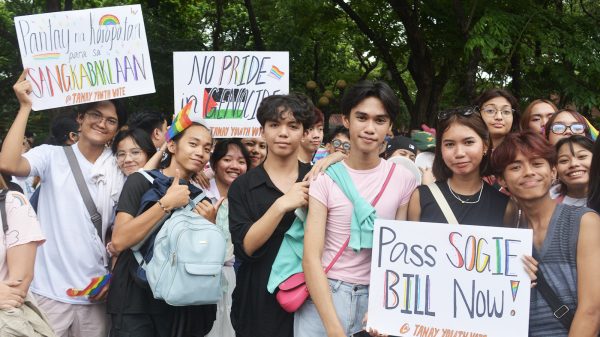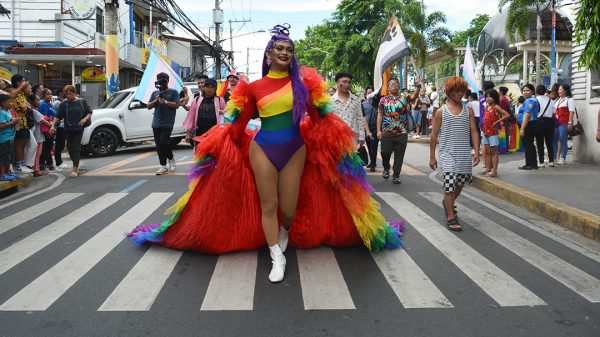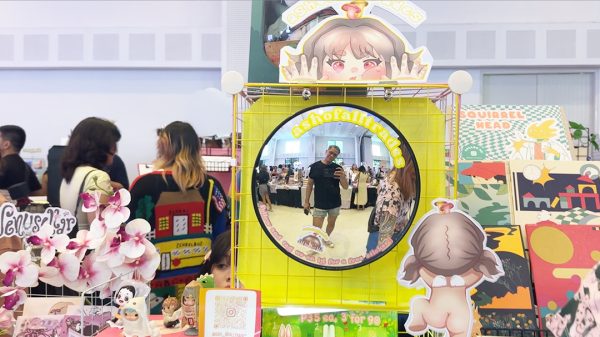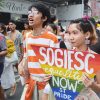
PHOTO BY JED YUMANG; HAIR AND MAKE-UP BY KAYE CANDAZA AND NICOLE MAGAY. PHOTO COURTESY OF BAHAGHARI CENTER.
In 2004, Rob Garner moved to Mongolia from Australia to start working for an international non-government organization (NGO) – for activists, what may be considered as a natural progression to be where the action is, so to speak. But while she was involved in human rights advocacy, as a whole, since the mid-1990s, focus on the lesbian, gay, bisexual and transgender (LGBT) community started to be magnified.
“When I first arrived in Ulaanbaatar, I tried to make contacts in the LGBT community, such as it was back then,” Rob says. “But it was very difficult; virtually everyone was closeted, the LGBT scene was very much underground, and there was no unity – or even a sense of a community – among gays and lesbians. Fear ran rampant, and at the outset I was looked upon with suspicion.”
It took a few months before Rob was able to establish any real friendships, but she acknowledged that “the fear was understandable and justified – LGBTs were arguably the most persecuted and stigmatized group in Mongolian society; discrimination existed in all spheres of society and violence was (and sadly still is) a regular occurrence.”
It was at that time that Rob met her former partner, “who was one of the original Mongolian LGBT activists. We shared a strong sense of social justice and vowed that we would take activism to a new level in Mongolia in order to effect demonstrable long-term change,” she recalled.
At the outset, their activities were largely based around community-building, documenting the human rights violations that were taking place against LGBTs, and trying (“Unsuccessfully at that point,” Rob said) to enlist support from local human rights and women’s organizations. “However, by the start of 2007 we realized that if we were to actually have any sort of real impact, we needed to set up an LGBT human rights NGO – the first such NGO to be established in Mongolia.”
To achieve this, “we gathered together a small group of brave activists and began that process at the start of 2007, knowing full well that it would be a long and difficult battle for registration. And so it proved to be. We struck prejudice and hostility from government agencies every step of the way. But we were determined to succeed, no matter how long it took. So we dug in for a long fight and fought with all we had.”
In the end, their persistence paid off. It took them almost three years, but in December 2009, Mongolia’s first, and still only, LGBT human rights NGO, the LGBT Centre, was registered. Rob was the founding executive director of the center.
Helping shape the LGBT movement in Mongolia is something that Rob is very proud of.
“I think the thing I am most proud of is being a part of a group of people who made history in Mongolia. We did what hadn’t been done before, in an extremely hostile environment. I am so proud of my Mongolian activist friends – they are the most courageous people I have ever met. Together we stood up to hate – virulent hate – and we triumphed. We conquered fear in the face of ever-present danger and daily threats to our lives. We survived abduction attempts and overcame the wrath of a society that viewed us as sick and perverted. And in so doing, we made change happen. In what we called ‘queer saturation’, we undertook a range of cross-sectoral advocacy initiatives that had not been done before in Mongolia. We put LGBT issues firmly on the human rights agenda and embedded an understanding of our identities in the public’s consciousness,” she said.

Rob Garner in action, as part of R-Rights’ efforts to organize the first Outgames in the Philippines (and Asia) in the earlier part of 2012.
Already, with the LGBT Centre, “we transformed a government – from haters to supporters. Within a year of our registration, we had elicited a government pledge to end discrimination against LGBT people and had secured a timetable for the enactment of non-discrimination legislation (i.e. 2014). We had begun LGBT human rights training for police, who in the past were complicit in the hate crimes taking place against our community. We had changed the minds of a previously hostile media and ushered in a new era of reporting, and for the first time we witnessed positive representations of us and our issues, and responsible and compassionate reporting. We had gained support from the National Human Rights Commission, civil society, trade unions, schools and universities. We received countless emails and phone calls from people telling us that their attitudes had changed. And, perhaps most importantly, we began to see a proud, empowered and unified LGBT community.”
Rob is, of course, realistic. “There is still a long way to go in Mongolia. Hate still exists, as does discrimination and violence. But the difference now is that there is hope. There is support. And there most definitely is change. There is no going back. Things can only continue to get better.”
In November 2011, Rob left Mongolia to move to the Philippines to be with her partner, Atty. Angie Umbac, who runs the Rainbow Rights Project Inc. (R-Rights). “Now I am doing whatever I can for the LGBT rights movement in the Philippines,” Rob smiled.
For Rob, “the Philippines is unfortunately not immune to hate crimes and discrimination. There are many areas that need improvement, and protection mechanisms that need to be put in place, notably the enactment of non-discrimination legislation. However, it’s immensely heartening to see so many activists from so many LGBT groups working hard to address these issues,” she said.
There remain many challenges for LGBTs, even within the ranks. “I guess the one thing that disappoints me is that I have seen some dissension among LGBT activists. This is ultimately counterproductive. Perhaps, though, that is to be expected with such a wealth of talented and creative people – there isn’t always going to be consensus,” Rob said. “But, on the whole, it is wonderful to see the level of activism that is taking place, be there consensus on some issues and advocacy directions or not.”
Rob finds inspiring “the level of activism here in the Philippines – so many groups, so many committed activists, so many events and actions. Coming from Mongolia, where I could literally count the number of out LGBTs on my fingers, it makes my heart soar. My heroes are here – and, from afar, I learnt a lot from them. We always kept a close eye on what was happening in the Philippines, and derived much inspiration and many ideas from the work being done here. Like many activists around the world, we celebrated Ladlad’s victory, it gave us so much hope. To be a part of the LGBT community here now, and to be continuing in advocacy with the brilliant team at R-Rights is truly a dream come true.”
Much remains needed to be done, and Rob intends to continue doing her share. When all is said and done, “I suppose I’d like to be remembered as someone who never stopped fighting for justice and equality, no matter how difficult or dangerous the circumstances, no matter how uphill the battle. I stood up for what I believed in and I never gave up,” she said. And to this end, “as long as discrimination and injustice against LGBTs persists, I will continue to do whatever I can, in any capacity I can, to make the world a better, safer place.”


























































